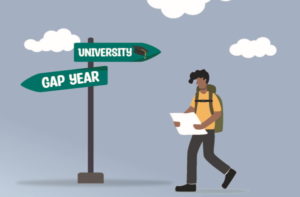ADHD and the College Transition: Rethinking a Gap Year
Janet Price
Attention Magazine December 2022
Download PDF
Over the last decade, more than half (an average 66%) of high school graduates went directly to college in America, but those numbers are now changing. The rising costs of college and questionable job market, worry about college preparedness, and pandemic have made millions of students question whether college is the correct path. In fact, NBC News has reported that four million fewer students left for college in 2021 than in 2011.
For students with ADHD, additional factors play into the decision of whether to go directly to college after high school graduation. The Journal of Learning Disabilities reports* that “college students with ADHD tend to have lower grade point averages, take longer to graduate, and have higher dropout rates than individuals without ADHD.” Various studies show that only between 30-40% of undergraduate students with learning disabilities earn their bachelor’s degree within six years, compared to roughly 60% of the neurotypical population.
 Families are taking a good look at if, when, and how they will pursue college enrollment and completion. An area that is often overlooked in this decision-making process is the possibility of taking a gap year. Too many educators are not well versed in all of the postsecondary options available to high school graduates, and those who have a general idea may not be familiar with programs that support individual needs. For students whose grades indicate that they are college-capable, the mindset seems to default to Ready, Set, Go! when a better option for postsecondary success might be Ready, Set, Reset!
Families are taking a good look at if, when, and how they will pursue college enrollment and completion. An area that is often overlooked in this decision-making process is the possibility of taking a gap year. Too many educators are not well versed in all of the postsecondary options available to high school graduates, and those who have a general idea may not be familiar with programs that support individual needs. For students whose grades indicate that they are college-capable, the mindset seems to default to Ready, Set, Go! when a better option for postsecondary success might be Ready, Set, Reset!
Three signs that a student may not be ready for college
Not all students who are college-capable are ready for the rigors of college straight out of high school. Here are three signs that indicate your student could benefit from a gap year.
- The student cannot manage assignments in high school (initiating, completing, and turning work in on time) independently.
Managing independently does not mean managing without support. Assistive technology, for example, or even a low-tech planner provides support that can be independently controlled and accessed by the student. However, if a student has access to online calendars or other planning tools but their parents or a teacher are the ones who are actually filling them in and chunking out timelines, then that student is not independent in this area. In addition, consider how the student utilizes accommodations such as extra time. Do they habitually wait until the last minute and then ask for extra time to complete assignments? Accommodations in college fall under a different set of federal laws. Colleges typically grant extra time for completing exams, but not for completing assignments which appear on a syllabus that the student is expected to manage. - The student is not proficient in life skills.
Even students for whom academics come easy are at risk for failure if they have not had practice managing “life skills” independently. Yes, a student should know how to do their own laundry (although taking advantage of mom and dad in this area when coming home for breaks is certainly a forgivable offense!).But beyond the obvious, consider whether your student takes medication independently or knows how to refill a prescription. How is their sleep hygiene? Are they self-regulated enough to get a good night’s sleep and wake up for an early class? What about electronics usage—will video games or social media interfere with being able to get to sleep or to class on time? Will they eat regularly and make healthy food choices? Any of these areas can significantly impact student success. - The student needs time for social/emotional maturation.
Self-advocacy skills and mental health are arguably even more important than academics when it comes to college success. According to the Mayo Clinic Mental Health System, studies have shown that since the start of the COVID-19 pandemic, one in three college students experiences significant depression and anxiety, and that up to 75% of these students are reluctant to seek help.** If there are questions about social/emotional readiness, are you confident that the student will ask for and access appropriate help independently?
When should families think about a gap year?
When to begin considering gap years is as fluid as when parents begin considering college. While parents can begin exploring what gap years can offer prior to the sophomore or junior years of high school, the real work of exploring real options can coincide with the junior-year process of creating the college list.
Most gap year specialists suggest that students apply to college and gap year programs simultaneously and then defer after the college acceptance. This path is easiest for the student because they are still in school, actively working with their college counselor for both admission processes. Gap year specialists can help families build a program that will allow the student to focus on areas that they want to strengthen before attending college and ultimately feel confident and prepared when they arrive at the college that they will attend.
How to choose a gap year program
Choosing the right gap year program is as important as choosing the right college, and a gap year plan should match the reasoning behind the decision to take the time for a reset. Taking a year off to travel and build homes in developing nations may be a wonderful choice for the student hoping to have better global awareness, but it will do nothing to address academic skill development for the student who isn’t ready for college because they’ve never written anything longer than a five-paragraph essay or two- to three-page paper.
Although there are a wide variety of structured, managed programs to choose from on a worldwide basis, a gap year can also be individualized. Maybe the right path is to spend a month or so overseas practicing Spanish and learning to work cooperatively with a diverse community of peers at a three- to seven-week program like Amigos de las Americas. Following that, the student might audit classes at a local community college to maintain academic skills and practice following a syllabus in a low-stress context.
Some students need more structured, explicitly taught support in concert with their college experience. Postsecondary support programs such as Mansfield Hall might fit the bill. While some may be familiar with this program as a postsecondary option in and of itself, for the right student it can serve as a gap option to improve academic preparedness.
Or maybe there is a need to address anxiety, depression, or other mental health concerns that cannot be adequately addressed in a typical college setting. Programs such as The Dorm with locations in New York City and Washington, DC, can be a good fit. The Dorm supports its college-bound clients in building the skill set and toolbox necessary for success. In their own words, “In addition to traditional therapeutic interventions, we slowly expose clients to real life academic and social situations providing them with the opportunity to practice their newly acquired skills in real time.”
Finally, there are many gap programs run by colleges and universities themselves, such as American University Gap Program, which combines internships of interest with a true college experience and academic credit.
For students with ADHD, additional factors play into the decision of whether to go directly to college after high school graduation.… An area that is often overlooked in this decision-making process is the possibility of taking a gap year.
For those families who are overwhelmed by the choices or who are unsure of how to create an individualized, needs-based plan, there are also a number of educational consultants and specialized gap year consultants who can help. When Ready, Set, Go becomes Ready, Set, Reset, outside professionals can help families and students frame these decisions with a growth mindset and a focus on long-term success.
 Janet Price is a gap year consultant with Essig Education Group and a member of the board of directors of The Novus Academy in Grapevine, Texas. She is the coauthor of the award-winning Take Control of Asperger’s Syndrome: The Official Strategy Guide for Teens with AS and NVLD (Prufrock Press 2010) and its follow-up, Take Control of Dyslexia and Other Reading Difficulties: The Ultimate Guide for Kids (Prufrock Press 2011), as well as numerous articles on a variety of special education topics. She has nearly two decades of experience in special education, both as a professional advocate for families and on the admissions end working with a national postsecondary support program.
Janet Price is a gap year consultant with Essig Education Group and a member of the board of directors of The Novus Academy in Grapevine, Texas. She is the coauthor of the award-winning Take Control of Asperger’s Syndrome: The Official Strategy Guide for Teens with AS and NVLD (Prufrock Press 2010) and its follow-up, Take Control of Dyslexia and Other Reading Difficulties: The Ultimate Guide for Kids (Prufrock Press 2011), as well as numerous articles on a variety of special education topics. She has nearly two decades of experience in special education, both as a professional advocate for families and on the admissions end working with a national postsecondary support program.
NOTES
*Will H. Canu et al., College Readiness: Differences Between First-Year Undergraduates With and Without ADHD. Journal of Learning Disabilities, Vol. 54, Issue 6, 2021. https://journals.sagepub.com/doi/abs/10.1177/0022219420972693
** Reese Druckenmiller, LICSW. College students and depression: A guide for parents. Speaking of Health Blog, Mayo Clinic Health System. July 19, 2022. https://www.mayoclinichealthsystem.org/hometown-health/speaking-of-health/college-students-and-depression
GAP YEAR PROGRAMS: FOR MORE INFO
Amigos de las Americas | https://amigosinternational.org
Mansfield Hall | mansfieldhall.org/academics/is-mansfield-hall-a-gap-year
The Dorm | thedorm.com/university-and-college-support
American University Gap Program | american.edu/provost/ogis/gap-year
Other Articles in this Edition
The Executive Function Podcast
Is Adult ADHD Related to Sleep Challenges?
How to Make Being Social Less Boring
Principles for Parenting a Girl with ADHD
Understanding Emotional Development
Excellence in Emerging ADHD Researchers
Finding Your Holiday Spirit Through Self-Care
Insights on ADHD and Executive Functioning (A Thinking Impairment)
